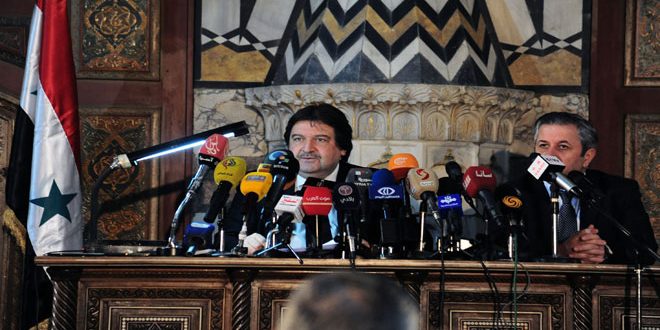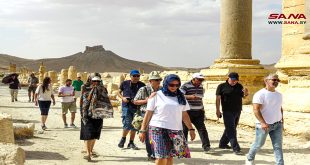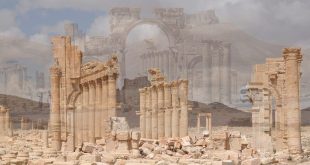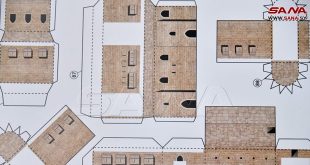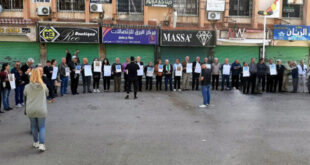Damascus, SANA – Culture Minister Mohammad al-Ahmad affirmed that the destruction of the façade of the Roman Theatre and the Tetrapylon in the archeological site of Palmyra by ISIS terrorists is a war crime and a “Zionist demand” per excellence.
In a press conference at the National Museum in Damascus, al-Ahmad said “what happened last Friday is obviously a Zionist demand and a Zionist attempt supported by the West and the petroleum sheikhdoms to destroy our identity, heritage and civilization.”
He added that the monuments in Palmyra do not belong to Syria alone, but they belong to the whole world, “and here comes the role of the international community to shoulder its responsibilities towards this horrible brutality unprecedented in history,” calling on the international community to support Syria in its battle for defending Palmyra against those who want to destroy its ruins and civilization.
He pointed out that the continued presence of ISIS terrorists in the city of Palmyra will expose the city to further risks as the terrorist organization destroyed in 2015 the tomb towers that date back to various eras extending between 44 and 103 DC, in addition to parts of the Temple of Bel and the Temple of Bel Shamin and murdering archeologist Khaled al-Asaad.
Responding to SANA question, the Minister said the General Directorate of Antiquities and Museums at the Ministry of Culture has managed during the terrorist war on Syria to rescue the absolute majority of museum collections from theft as it transported more than 90% of these pieces to safe places in cooperation with the local community, indicating that the rate of theft, including stolen items from Raqqa Museum, did not exceed 1%.
The Minister pointed out that the Directorate has documented, packaged and photographed all the pieces which have been transported to Damascus and safe areas, particularly the acquisitions of the museums in Deir Ezzor, Aleppo and Palmyra, Hama, Homs, Daraa and Quneitra, in addition Lattakia and Tartous.
He added that since 2012, the Directorate has started exceptional relations with the international culture organizations such as UNESCO and International Council of Museums (ICOM), Interpol and International Customs to garner support for its efforts to protect its cultural heritage.
M. al-Frieh/H. Said
 Syrian Arab News Agency S A N A
Syrian Arab News Agency S A N A
